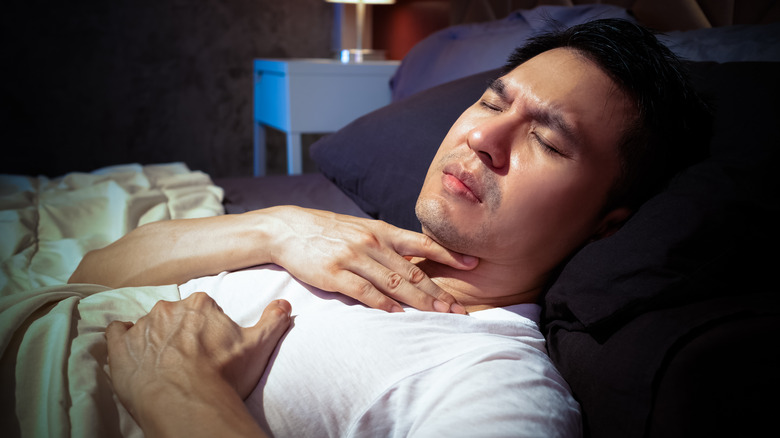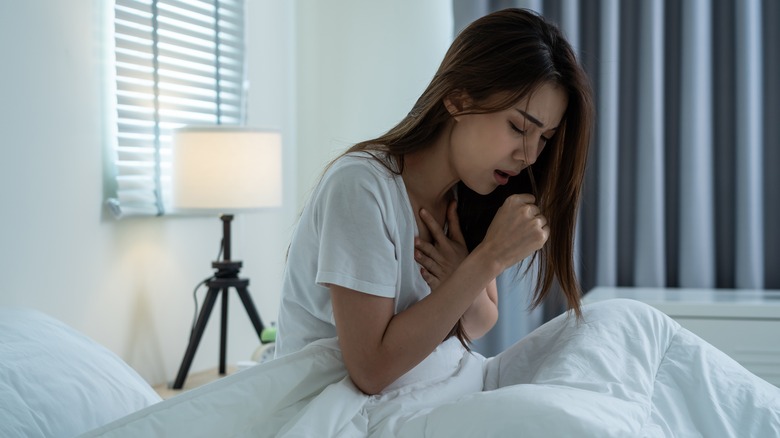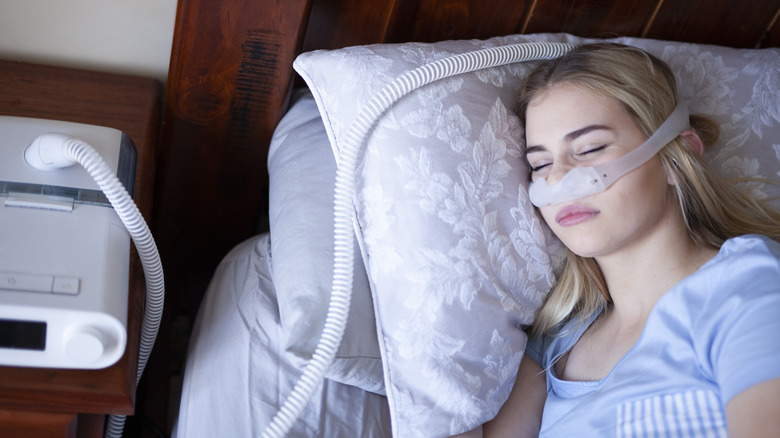Warning Signs Your Heartburn Is Actually Sleep Apnea
It's hard to underestimate how much impact heartburn can have on the length and quality of your sleep. Fortunately, most cases of bedtime heartburn are fleeting, and future episodes can be avoided with lifestyle changes like not eating too close to bedtime, calling it quits on alcohol before hitting the sack or avoiding a too-spicy dinner.
But what if your overnight heartburn doesn't go away after making those modifications? In that case, your heartburn might be a sign that you have sleep apnea.
Sleep apnea occurs when the tissues in the back of your throat relax too much during rest, thereby obstructing both your incoming and outgoing air, explains MedlinePlus. As a result, you may suddenly wake up gasping or choking several times every hour. This repetitive cycle of disrupted sleep can take a toll on you physically and emotionally because it interferes with your ability to get at least seven hours of recuperative sleep (per Office of Disease Prevention and Health Promotion).
The Mayo Clinic states that other warning signs of sleep apnea can include excessive daytime sleepiness, loud snoring, episodes of not breathing during sleep, waking up with a dry mouth or sore throat, morning headaches, problems concentrating, depression or irritability, high blood pressure, and loss of libido. If you are experiencing symptoms like these in addition to heartburn, it may be time to consult with a doctor about getting a sleep study.
How sleep apnea can cause heartburn
But what exactly is happening inside your body that's causing both sleep apnea and heartburn? The answer lies in understanding the two conditions. Simply put, chronic heartburn, also known as gastroesophageal reflux disease or GERD, occurs when the esophagus doesn't close properly and allows stomach acid to move upward toward the mouth. During sleep apnea episodes, the irregular muscular movements in the esophagus and back of the throat can cause uncharacteristically strong suction. This suction is essentially a "negative" suction since it draws stomach acid upward rather than downward and into the digestive tract where it belongs. As the stomach acid inches upward into the esophagus, it creates an unpleasant and uncomfortable burning sensation in the back of the throat and sometimes the mouth. Consequently, the overall effects of GERD and sleep apnea can make sleep a challenge.
While evening heartburn is not a definitive indicator of sleep apnea, a 2021 review published in Current Gastroenterology Reports did conclude that GERD and sleep disturbances often go together. The review's authors added that the upside to the relationship between the two conditions is that treating or managing one might lessen the impact of the other. Additionally, in another study from a 2023 issue of the Journal of Respiration, researchers discovered that individuals with sleep apnea were more likely to have existing GERD than those without sleep apnea. They were also more likely to develop GERD and heartburn.
Treating sleep apnea might help heartburn too
If you have heartburn that wakes you up, consider contacting a provider who can evaluate you for both GERD and sleep apnea or refer you to a gastroenterologist or sleep specialist. That way, you can determine if you have either or both disorders.
Wondering if you might be predisposed to either sleep apnea or GERD? A 2022 national study of sleep apnea and GERD patients found in Cureus noted that people living with both conditions tended to be smokers with diabetes who were white, female, and obese. Consequently, if you have any of those risk factors, you might want to pay special attention to the quality of your sleep.
Should you be diagnosed with sleep apnea, you might be introduced to something called a continuous positive airway pressure (CPAP) machine. A CPAP machine is a piece of medical equipment worn at night that helps keep your airway from collapsing into the back of your throat. As an older study from 2016 published in the Journal of Clinical Sleep Medicine explains, compliantly using a CPAP machine each night could provide relief from the adverse effects of GERD and sleep apnea. In other words, you might be able to solve all your sleep disturbances at once with just one type of therapy, which might be a dream come true.


